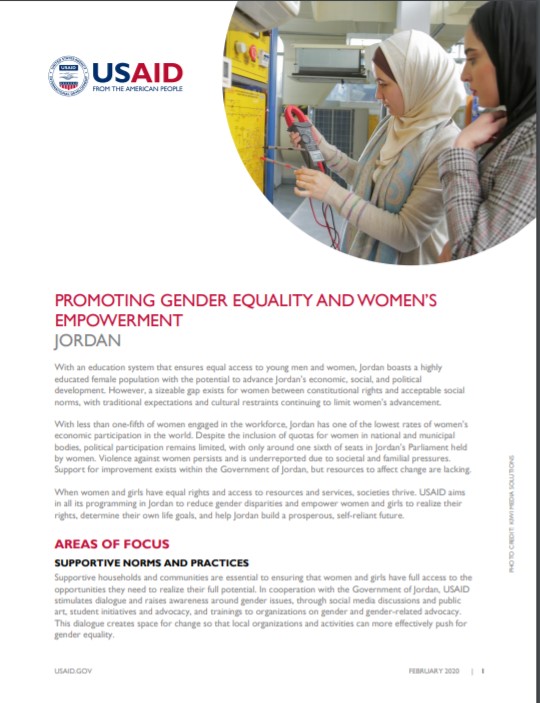Speeches Shim
JORDAN
With an education system that ensures equal access to young men and women, Jordan boasts a highly educated female population with the potential to advance Jordan’s economic, social, and political development. However, a sizeable gap exists for women between constitutional rights and acceptable social norms, with traditional expectations and cultural restraints continuing to limit women’s advancement.
With less than one-fifth of women engaged in the workforce, Jordan has one of the lowest rates of women’s economic participation in the world. Despite the inclusion of quotas for women in national and municipal bodies, political participation remains limited, with only around one sixth of seats in Jordan’s Parliament held by women. Violence against women persists and is underreported due to societal and familial pressures. Support for improvement exists within the Government of Jordan, but resources to affect change are lacking.
When women and girls have equal rights and access to resources and services, societies thrive. USAID aims in all its programming in Jordan to reduce gender disparities and empower women and girls to realize their rights, determine their own life goals, and help Jordan build a prosperous, self-reliant future.
AREAS OF FOCUS
SUPPORTIVE NORMS AND PRACTICES
Supportive households and communities are essential to ensuring that women and girls have full access to the opportunities they need to realize their full potential. In cooperation with the Government of Jordan, USAID stimulates dialogue and raises awareness around gender issues, through social media discussions and public art, student initiatives and advocacy, and trainings to organizations on gender and gender-related advocacy. This dialogue creates space for change so that local organizations and activities can more effectively push for gender equality.
EFFECTIVE ADVOCACY AND POLICY REFORM
Governing institutions and legal frameworks can provide a national model for gender equality in Jordan. USAID supports the Government of Jordan’s efforts to institutionalize gender equality through training and supporting public sector workers to identify and address gender-related issues in the workplace, and through supporting regulatory reform to increase women’s participation and leadership in the public sphere. In addition, USAID trains local organizations in order to strengthen genderrelated grassroots advocacy efforts.
GENDER-SENSITIVE SUPPORT SERVICES
Promoting Gender Equality and Women's Empowerment ![]() (pdf - 218k)
(pdf - 218k)
USAID partners with the Government of Jordan, the private sector, and civil society to help women overcome systemic barriers to their civic, economic, and political participation. These efforts include expanding access to finance for woman to establish and expand small businesses, offering professional development opportunities to help women advance in their careers, providing training and opportunities for women to engage in politics, and strengthening gender-specific health services.
NOTEWORTHY ACHIEVEMENTS
- USAID has backed Jordanian efforts to implement reforms to protect the rights of women and encourage participation in the public sphere, including the repeal of an article in the penal code allowing perpetrators of sexual assault to escape punishment if they married their victims, and the Government of Jordan’s adoption and implementation of the Flexible Working Hours Bylaw to encourage women’s economic participation.
- As of January 2020, USAID facilitated four years of online debates and conversations on gender priorities, receiving more than 1,225,000 engagements on Facebook, 340,000 impressions on Twitter, and 42,300 views on YouTube. In total, this outreach resulted in over 1,600,000 instances of online social dialogue, fostering dynamic, open discussion creating space for change in gender norms and expectations.
- In Jordan’s 2017 local elections, 58 women out of 177 who participated in USAID campaign management and candidacy training were elected to office on municipal and governorate councils. These women contributed to an increase in women’s participation in municipal councils from 36 percent in 2013 to 41 percent in 2017.
- In 2006, only 6 percent of judges in Jordan were women. USAID increased participation of women in law through the Future Judges Scholarship Program for the study of international law, while also supporting the Government of Jordan to introduce merit-based hiring for judicial appointments, resulting in an increase in female judge appointment. Since then, female representation has more than tripled, with women constituting 22 percent of Jordan’s judges.


Comment
Make a general inquiry or suggest an improvement.